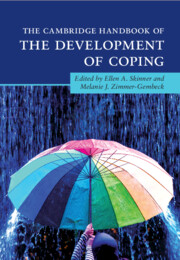Book contents
- The Cambridge Handbook of the Development of Coping
- Cambridge Handbooks in Psychology
- The Cambridge Handbook of the Development of Coping
- Copyright page
- Contents
- Contributors
- Preface
- 1 A Systems Perspective on the Development of Coping
- Part I Theoretical Perspectives on the Development of Coping
- Part II Methods for Studying the Development of Coping
- Part III Neurophysiological and Experiential Bases of the Development of Coping
- Part IV Psychological Foundations of the Development of Coping
- Part V Social Contexts and the Development of Coping
- Part VI Application and the Development of Coping
- 25 Social Media Use and Misuse, Stress, and the Development of Coping
- 26 Clinical Treatments for Child Emotional Disorders and the Development of Coping
- 27 Fostering the Development of Academic Coping
- 28 Youth Programs and the Development of Coping
- Index
- References
25 - Social Media Use and Misuse, Stress, and the Development of Coping
from Part VI - Application and the Development of Coping
Published online by Cambridge University Press: 22 June 2023
- The Cambridge Handbook of the Development of Coping
- Cambridge Handbooks in Psychology
- The Cambridge Handbook of the Development of Coping
- Copyright page
- Contents
- Contributors
- Preface
- 1 A Systems Perspective on the Development of Coping
- Part I Theoretical Perspectives on the Development of Coping
- Part II Methods for Studying the Development of Coping
- Part III Neurophysiological and Experiential Bases of the Development of Coping
- Part IV Psychological Foundations of the Development of Coping
- Part V Social Contexts and the Development of Coping
- Part VI Application and the Development of Coping
- 25 Social Media Use and Misuse, Stress, and the Development of Coping
- 26 Clinical Treatments for Child Emotional Disorders and the Development of Coping
- 27 Fostering the Development of Academic Coping
- 28 Youth Programs and the Development of Coping
- Index
- References
Summary
The current chapter sets out to create a holistic overview of the relationships between social media use, stress, and coping. It discusses the ways in which social media can be employed as an adaptive way of coping by supporting information seeking and by providing online social support. However, the nature and design of social media platforms can enable maladaptive ways of coping by facilitating cyberbullying and negative online social comparison. Furthermore, the chapter examines how social media can be a coping liability when the user is psychologically dependent or addicted to media, or when their use prevents them from learning other ways to cope. Additionally, social media use is introduced as a stressor for young users through fear of missing out. Lastly, social media can be a resource for coping by providing assistance in coping with social media-related stressors and by providing ways to establish social resources or social support.
Keywords
- Type
- Chapter
- Information
- The Cambridge Handbook of the Development of Coping , pp. 597 - 611Publisher: Cambridge University PressPrint publication year: 2023
References
- 2
- Cited by

